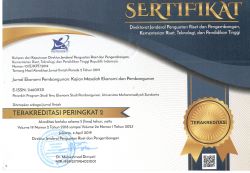The Effectiveness of Monetary Policy Towards Stock Index Case Study : Jakarta Islamic Index 2006-2014
Lak lak Nashat el Hasanah(1*), Jihad Lukis Panjawa(2)(1) Program Studi Ekonomi Pembangunan Fakultas Ekonomi Universitas Islam Indonesia
(2) Program Studi Ekonomi Pembangunan Fakultas Ekonomi dan Bisnis Universitas Muhammadiyah Surakarta
(*) Corresponding Author
Abstract
Keywords
Full Text:
PDFReferences
Antonio, M. S., & Fauzi, H. (2013). The Islamic Capital Market Volatility : A Comparative Study Between In Indonesia And Malaysia. In Buletin Ekonomi Moneter dan Perbankan. 391–416
Bank Indonesia. (2009). Outlook Ekonomi Indonesia 2009-2014, Edisi januari 2009. Access at 30 oktober 2015, From http://www.bi.go.id
Bank Indonesia. (2015). Jurnal Bank Indonesia. Access at 30 oktober 2015, From http://www.bi.go.id/moneter/data
Beik, I.S & W. Wardhana. 2011. Te Relationship between Jakarta Islamic Index and Other Selected Markets: Evidence from Impulse Response Function. Majalah Ekonomi. Vol.XXI No.2.
Bursa Efek Indonesia. (2015). BEI monthly Statistic Report. Diambil tanggal 30 oktober 2015, dari situs http://www.idx.co.id/stock
Sani G.A and Wahyudi I (2014), Interdependence between Islamic capital market and money market: Evidence from Indonesia, Borsa Istanbul Review, Volume 14, Issue 1, March 2014, 2
Handayani. 2007. Pengaruh Tingkat Suku Bunga SBI, Nilai Kurs Dollar AS, dan Tingkat Inflasi terhadap Indeks Harga Saham Gabungan (IHSG) (Studi di Bursa Efek Jakarta), Tahun XVIX No. 1, Januari-Juni 2008. 55-67
Hussin, M.Y.M, et.al. 2012. Macroeconomic Variable and Malaysian Islamic Stock Market: A time Series Analysis. Journal of Business Studies Quarterly. Vol.3 No.4,.1-13.
Jonathan, Timotius Ibram. 2013. Analisa Pengaruh Inflasi, Suku Bunga dan Kurs Terhadap Volume Transaksi Pada Index LQ45. FINESTA: 1 (2) 141-144
Kristanti, F. T., & Lathifah, N. T. (2013). Pengujian variabel makro ekonomi terhadap jakarta islamic index. Jurnal Keuangan Dan Perbankan, 17(1), 220–229.
Mulyani, N. (2014). Analisis Pengaruh Inflasi, Suku Bunga, Nilai Tukar Rupiah, Dan Produk Domestik Bruto Terhadap Jakarta Islamic Index. Jurnal Bisnis Dan Manajemen Eksekutif Vol. 1 No. 1, 2014, Artikel 10, 1(1).
Pasaribu, Rowland Bismark Fernando.,dan Mikail Firdaus. (2013). Analisis Pengaruh Variabel Makroekonomi terhadap Indeks Saham Syariah Indonesia. Jurnal Ekonomi dan Bisnis, Fakultas Ekonomi Universitas Gunadarma, Depok, Vol. 7, No. 2, Juni 2013.
Sihono, T. (2008). Krisis Finansial Amerika Serikat dan Perekonomian Indonesia. Jurnal Ekonomi & Pendidikan, 5(2), 171–19
Wijaya, Renny, (2013). Pengaruh Fundamental Ekonomi Makro Terhadap Indeks Harga Saham Gabungan Pada Bursa Efek Indonesia Periode 2002-2011, Calyptra: Jurnal ilmiah mahasiswa universitas surabaya Vol 2 No 1, 1-5
Article Metrics
Abstract view(s): 1126 time(s)PDF: 945 time(s)
Refbacks
- There are currently no refbacks.
















